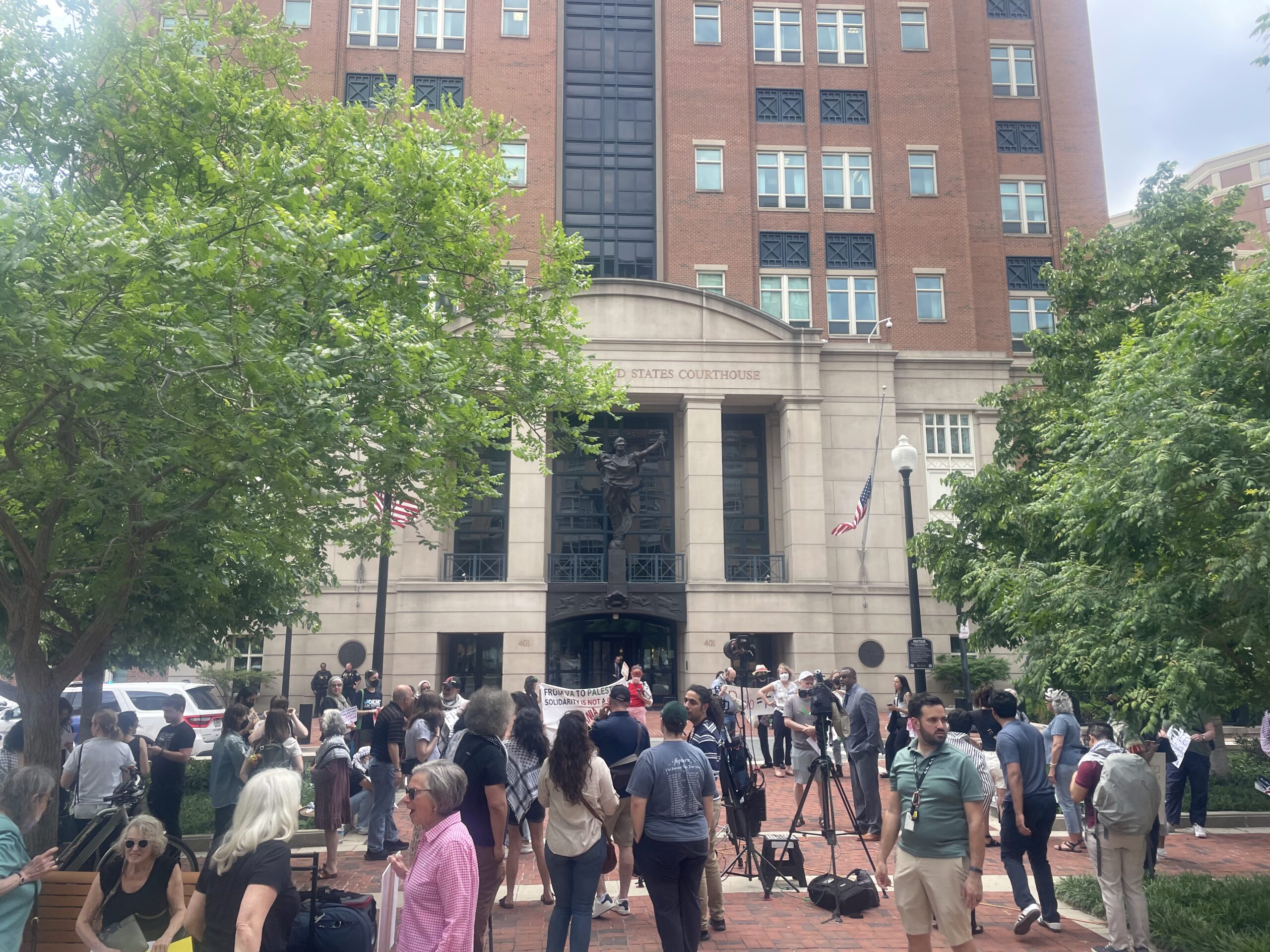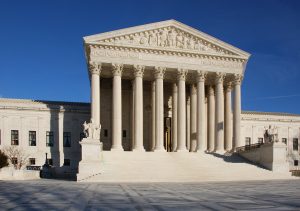Federal lawyers and Dr. Badar Khan Suri’s legal team clashed in court Thursday about where the detained Georgetown postdoctoral fellow’s hearing should take place, with federal judge Patricia Tolliver Giles ultimately delaying a ruling until the Trump administration provides more information.
The hearing took place at 1 p.m. at the district court for the Eastern District of Virginia. The proceedings centered around whether Khan Suri’s unlawful detention suit against the Trump administration should be filed in the Eastern District of Virginia, where Department of Homeland Security (DHS) officials initially detained him, or in Alvarado, Texas, where he is currently held in the Prairieland Detention Center.
The hearing adjourned at around 3 p.m. after Giles asked federal lawyers to respond to her questions regarding the allegedly abnormal circumstances of Khan Suri’s transportation between five different Immigrations and Customs Enforcement (ICE) detention centers.
Giles’ questioned whether Khan Suri’s removal from the Farmville facility was typical protocol, how many other Farmville detainees were removed at the same time as Khan Suri, and whether it was normal practice to remove him from Farmville in the middle of the night. These questions have arisen from Khan Suri’s lawyers’ assertion that the conditions of Khan Suri’s detainment are abnormal.
Federal lawyers will have until 5 p.m. on Friday, May 2, to answer Giles’ questions. Khan Suri’s lawyers also asked for an opportunity to answer the same questions, which Giles granted. They will have until 6 p.m. Saturday to respond. Giles said that she would rule on the motion regarding jurisdiction after the weekend.
Khan Suri, a postdoctoral fellow at Georgetown’s Alwaleed Bin Talal Center for Muslim-Christian Understanding, was detained outside his home in Rosslyn, Virginia on March 17. According to a memorandum filed by his legal team, at the time of his detainment, ICE officials told Khan Suri, who is in the U.S. legally on an exchange visa, that he was being arrested because “someone at a very high level at the Secretary of States office did not want him to be in the country.” Khan Suri’s lawyers argue that his detention is retaliation for his familial ties to Hamas.
Khan Suri is married to Mapheze Ahmad Saleh (MSFS ’26), a U.S. citizen primarily raised in Gaza. A 2018 Hindustan Times interview with Saleh said that her father was a “senior political advisor” to Hamas. Saleh’s father left the group and publicly condemned its attacks on Israel on Oct. 7, 2023, calling them a “terrible error.” Saleh became the target of online scrutiny for her father’s association with Hamas after CAMERA on Campus, a nonprofit dedicated to “defending Israel against hostility and distortions on campus,” released an article about her family connections in February.
On March 19, two days after his detainment, Khan Suri’s lawyers filed a petition alleging that the Trump administration violated his free speech rights under the First Amendment and right to due process under the Fifth Amendment.
Disputes over jurisdiction
At Thursday’s hearing, Giles heard arguments surrounding the ongoing disputes about where Khan Suri’s case should be tried. On April 1, the Trump administration filed a motion to dismiss the case, as they argued Khan Suri’s legal team should either request a transfer of Khan Suri v. Trump to be tried in the Northern District of Texas, where Khan Suri is currently held, or dismiss the case entirely so that Khan Suri’s counsel can refile it in that district.
In the courtroom, federal lawyer David J. Byerley argued that because Khan Suri’s petition challenges his physical confinement, his case should be tried where he is currently confined. He argued that Khan Suri was not in the Eastern District of Virginia at the time that his legal team filed his petition, and that Khan Suri cannot be tried in Eastern Virginia.
One of Khan Suri’s lawyers, Vishal Agraharkar, argued that his case can be rightfully tried in the Eastern District of Virginia, as his exact location was unknown at the time when his suit was filed because the U.S. government moved where he was detained several times and provided conflicting information about the name and address of his detention center.
“When we filed Dr. Suri’s petition, we didn’t know where he was,” Agraharkar said.
Agraharkar also argued that the Eastern District of Virginia was the most appropriate location to try Khan Suri’s case because the courthouse is close to Khan Suri’s counsel, family, his home residence, and the place of his arrest.
Since his detainment, Khan Suri has been held in five different facilities. Directly after his arrest he was transported to the ICE Washington Field Office in Chantilly, Virginia before being transferred only two hours later to Farmville Detention Center in Farmville, Virginia. The next afternoon, Khan Suri was moved to an ICE facility in Richmond, Virginia before a transfer to Alexandria Staging Facility in Alexandria, Louisiana that night. Three days later, on March 21, Khan Suri was transferred to Prairieland Detention Center in Alvarado, Texas, where he has remained since.
Timeline based on filings by Khan Suri’s legal team
According to Byerley, ICE had “no plans to remove him from the U.S.,” though Giles already blocked any efforts to do so in a March 20 order. However, Agraharkar and Giles agreed that Khan Suri’s case was not challenging Khan Suri’s right to remain in the U.S., but rather his detainment.
Documentation concerns
Giles raised concerns about the actual time of Khan Suri’s arrival in Louisiana, which puts into question whether his legal team could have reasonably known his location and thus filed the petition in another district.
In a March 20 memorandum, Khan Suri’s team said that his petition was filed at 5:59 p.m. Eastern Daylight Time (EDT) on March 18. Byerley said that Khan Suri landed in Louisiana on March 18 at 5:05 p.m. and was officially “booked” or registered at the detention center at 5:42 p.m. However, documents do not state whether that denotes 5:42 p.m. EDT or Central Daylight Time (CDT), as Louisiana is in CDT. While Byerley said that 5:42 p.m. likely refers to EDT, Giles responded that Louisiana is in CDT and thus it is unclear why the document wouldn’t denote it if the filers changed the time zone.
If Khan Suri was officially booked at 5:42 p.m. CDT that would mean that he was registered in the system as being in Alexandria, Louisiana at 6:42 p.m. EDT—46 minutes after his legal team filed the petition. However, if federal lawyers are correct that ICE officials changed the time zone without documenting it, then he would have been booked 12 minutes before the petition was filed.
Both Giles and Khan Suri’s legal team also questioned whether Khan Suri could have reasonably been booked within 42 minutes of his arrival in Louisiana. According to his team, Khan Suri arrived at the detention center via plane with 300 other “shackled” individuals. Allegedly, while the plane landed “not far” from the detention center, each detainee had to be unshackled and then transported to the center. Khan Suri himself alleged in a declaration that he was not booked until several hours after his arrival in Louisiana.
In his Notice to Appear (NTA), which is a summons to appear in immigration court, Khan Suri’s residence is listed as 1209 Sunflower Lane, El Dorado, Texas, which is the address of a federal immigration facility in Texas. Giles questioned why that would be listed as Khan Suri’s address, as both she and Khan Suri’s legal team noted that a detainee’s residence is typically redacted but lists the place where they actually permanently reside, not a detention center that they may be sent to. According to his legal team, when Khan Suri questioned why the Texas address appeared as his residence, detention center officials told him that it was “computer generated” and the address could change in the future.
Agraharkar portrayed this decision as attempting to “dictate jurisdiction by writing it on a piece of paper,” arguing that the government broke from procedure so that they could argue that his case should be tried in Texas.
The “unknown custodian” rule
Many of Khan Suri’s team’s arguments centered around Khan Suri having an “unknown custodian” at the time of filing. The “unknown custodian” is used in cases where specific details about where a detainee is held or physically located are unclear, and thus the center or prison that would have custody over the individual is unknown. Giles agreed with Agraharkar, stating that “this is one of those extraordinary circumstances” where the “unknown custodian” argument would apply.
In the case of Columbia University activist Mahmoud Khalil, who was detained by ICE for his involvement in pro-Palestine activism and was also transferred to a Louisiana detention facility, a federal court ruled that because his location was unknown at the time of his suit being filed, it would be tried where he was detained in New Jersey. Khalil’s case used the same argument as Khan Suri’s team regarding an unknown custodian at the time of filing.
Khan Suri’s team argued that not only did his team not know where he was, but Khan Suri himself was unsure of where he was being moved to or how long he would be in one place.
“They refused to tell him where he was being moved,” Agraharkar said.
According to documents read by Giles, Khan Suri was also allegedly told by ICE officials while in Chantilly, Virginia that he would either remain in Chantilly or be moved closer to his family.
“That’s not giving him any indication he would be held anywhere but this district,” Giles said. “His original place was in Virginia, that was where he was arrested, where he was taken to a detention center, he was even told he would be held here.”
Giles also questioned Byerley about whether Khan Suri’s transfers to Louisiana and Texas were necessary. She pointed to the fact that, according to filings, Khan Suri was allegedly transferred from Farmville because of overcrowding, but Khan Suri had his own cell in Farmville, whereas one third of the detainees at Prairieland are sleeping on the floor. She also pointed out that detainees held at Farmville are typically there for extended stays, and that there are specific detention centers meant for transfers, known as under 72 hour facilities.
Rally outside the courthouse
Outside the court, dozens of activists held banners in support of Khan Suri and the Free Palestine movement before, during, and after the hearing.
Medea Benjamin, co-founder of anti-war organization CODEPINK, was among the 70 or so people who attended a rally outside the hearing. Benjamin emphasized the importance of supporting Khan Suri and bringing his case to public attention.
“I also have been concerned that we haven’t heard enough about this case, that there’s been so much attention on the Columbia students,” Benjamin told the Voice. “This case for some reason has been more in the background and it shouldn’t. It should be upfront and center. I think it’s important and this is an indication—all the people came out for this, all the press—that is finally getting the kind of attention that he deserves. And of course, what he deserves is to be out of detention.”
Mapheze Ahmad Saleh, Khan Suri’s wife, spoke to the press outside the court about the conditions he faced in detainment and the impact of his arrest on their family.
“His unjust and illegal arrest has turned our life upside down. Our three children have not seen their father for 44 days. They have only seen him on a screen wearing a red uniform used for those considered the most dangerous people in detention centers. Our very young twins are not aware of what’s going on. They just want their father to come back. But our oldest has a sense. He cries all the time and tried to hide his tears from his siblings after the arrest,” Saleh said.
A rallygoer who spoke to the Voice on the condition of anonymity said that she decided to come out to court to show support for Khan Suri and for the detentions of other immigrants in the U.S.
“We’re here to show solidarity with Dr. Suri, who was abducted illegally by the United States. He’s being punished for a broader movement for the liberation of Palestine, including a movement that’s calling for the end of the genocide in Palestine,” she said. “But also we’re acknowledging that there are state abductions happening of other immigrants as well who have nothing, no relation to the Palestine movement.”.
She emphasized the impact of Khan Suri’s arrests on Americans’ first amendment rights.
“Being denied your First Amendment rights, particularly in the context of a genocide, is unacceptable,” she said. “This is something that should scare all people, even those who aren’t engaged in the anti-war, anti-genocide movement. It’s particularly alarming in the context of academic institutions where open discussion should be encouraged for the sake of learning.”
Saleh also spoke on the importance of free speech as an American principle.
“I urge Americans and everyone watching us to speak out against this unlawful attack on the most basic of freedoms. I still believe in the principle this country was built on, that speech and beliefs are protected and must not be punished,” she said.
Saleh said that the Trump administration is unjustly persecuting Khan Suri for his beliefs.
“Why is the Trump administration persecuting him? Because he fell in love with and married a Palestinian, because he dared to express his belief in nonviolence, and because he spoke out bravely against the genocide of my people in Gaza,” Saleh said.
Editor’s note: This article was updated to indicate that Khan Suri was booked at the Louisiana detention center at 5:42 p.m., not 5:47 p.m. This change reflects information from legal documents that came out after the hearing.






